Last Updated on May 15, 2024
In the era of digitalization, China’s e-commerce market has continued to grow and adapt to meet the ever-changing demands of Chinese consumers and merchants. These developments have brought about the emergence of multiple e-commerce platforms and has led to the market dominance of Chinese online retail. In this highly competitive market, the leading platforms are JD.com, Taobao and Tmall.
Number of online shoppers in China from 2009 to 2020
(Source: Statista)
The rise in China’s growing e-commerce market
- E-Commerce sales reached 24.9% of total sales in China in 2020, up from 20.7% in 2019.
- Sales expected to reach around 64% of total retail sales market in 2023 with an estimated amount of US$1.9 trillion.
- Number of online shoppers reaches over 782 million in 2020.
- Online retail in China has gained huge traction since the outbreak of Covid-19.
What do Chinese consumers want to find when shopping on e-commerce sites?
Chinese consumers are very tech-savvy and want to make purchases from platforms that are trustworthy and recommended. Tmall International and JD Global are two of the leading e-commerce platforms for consumer confidence in China.
These marketplaces provide consumers with a one-stop shop for verified brands and products. Remember, familiarity breeds trust, and brands that use these already established platforms will prove to benefit from their high-profile status.
Consumer confidence in product authenticity on cross-border e-commerce platforms in China as of December 2017, by platform
(Source: Statista)
Tmall: One of China’s biggest e-commerce platforms
In 2010, Chinese powerhouse Alibaba group created Tmall (天猫) within their e-commerce platform Taobao (淘宝网). Tmall allows consumers to browse and make transactions of both Chinese and cross-border products.
More and more foreign companies are seizing on the opportunity to create digital stores with Tmall and gain convenient access to the Chinese marketplace. International companies such as Ray-Ban, Burberry, Adidas, and Calvin Klein all have virtual stores on Tmall.
Tmall is one of the leading players for e-commerce in China, coming only second to Taobao in terms of gross merchandise volumes (GMV).
(Source: Statista)
Tmall has established itself as one of the strongest players for e-commerce because of the trust that consumers have when purchasing – they know that they are buying from reliable and verified brands and stores.
The statistics show just how influential Tmall is as a connection point between vendors and Chinese consumers. In terms of gross merchandise volume, Tmall reached 3,202 billion RMB, up from 847 billion RMB in 2015.
Further, as you can see in the graph below, Tmall accounted for 63.8% of all online transactions over all B2C platforms in China, way beyond JD.com who in second place accounted for 25.9% of transactions.
(Source: Statista)
Opening a store on Tmall.com
Creating an online store on Tmall requires preparation and considerable financial costs.
Set-up and Operational Costs
For set-up costs, a flagship store is between US$ 7,680 to US$ 15,370 and the marketplace has a fee of between US$ 15,370 (100,000 RMB) to US$ 23,000 (150,000 RMB).
In regard to operational costs, you will have to pay between US$ 4,610 to US$ 9,220 for technical services every year, pay Tmall’s sales commission of between 0.5%-10% of sales (usually around 2%-5%) and Alipay will get 1% of your sales.
Tmall has strict regulations for registration and operations:
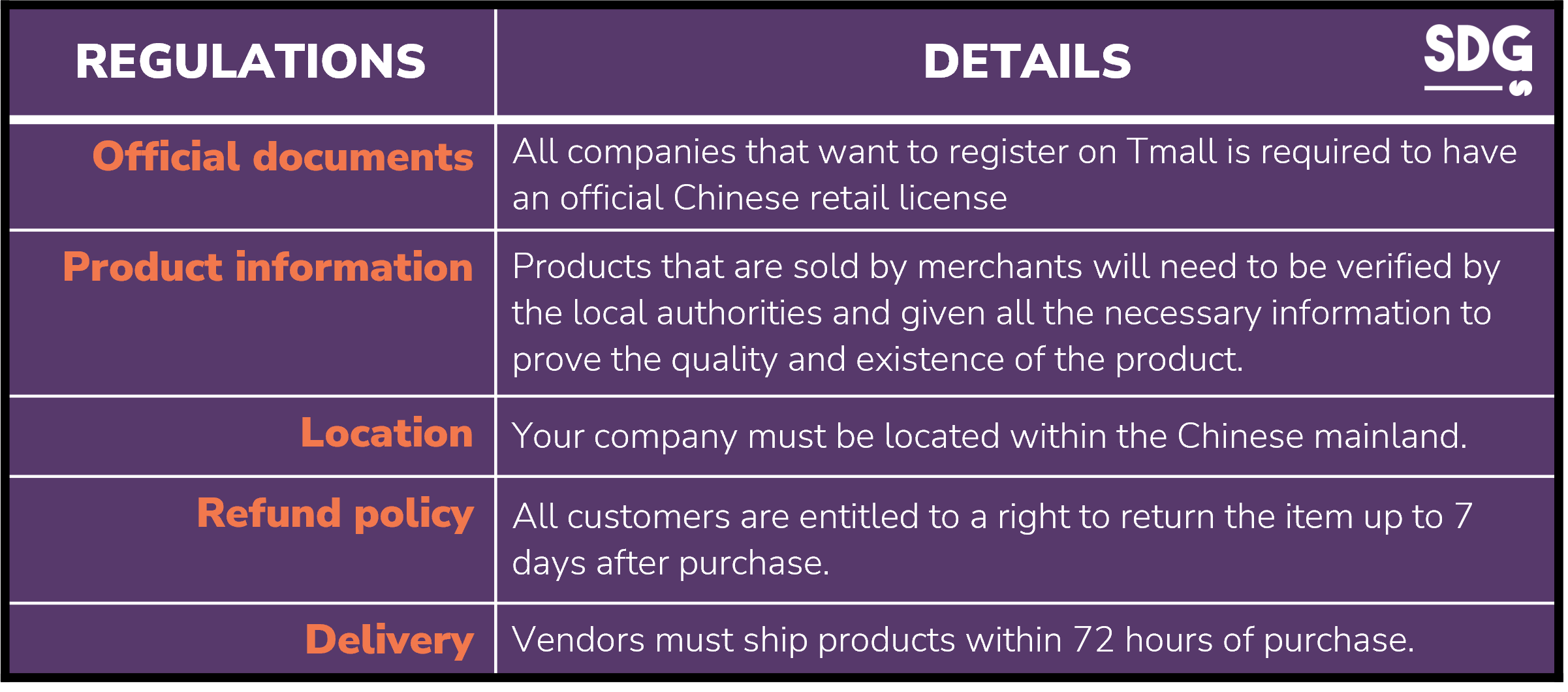
For more information on the rules and regulations, you can go to Tmall’s official website.
Companies that want to establish a digital store on Tmall will also need to acquire a third-party player called a “Tmall partner”. They help businesses localize and operate on Alibaba’s e-commerce platforms.
The three stores you can open on Tmall
-
Authorized Stores
Merchants that have the required authority to sell from one brand or multiple brands from the same entity on Tmall can open an authorized store.
To open these stores:
- The merchant must hold the authorization documents from the brand owner.
- The documents from the brand owner must not be subject to regional restrictions.
- Are subject to special approval from Tmall.com.
-
Speciality Stores
Merchants that want to sell products from two or more brands within the same product category can use speciality stores on Tmall.
- Specialty stores allow merchants to sell products from two or more brands that the merchant doesn’t own.
- Merchants also have the choice to sell their owned brands alongside ones that they don’t.
- The store can also sell two or more merchant owned brands.
- Speciality stores can only be created within one product category.
-
Flagship Stores
Flagship stores can be opened when the merchant is the owner of the brand or has exclusive authorization from the brand to open their store on Tmall.
- Flagship store merchants sell and act on the behalf of a single brand, or multiple brands that are all owned by the same merchant.
- The store can also sell on behalf of a multi-brand marketplace owned by the merchant who is opening the store.
- Subject to special approval from Tmall.com.
Opening a flagship store on Tmall requires a list of documents from the merchant:
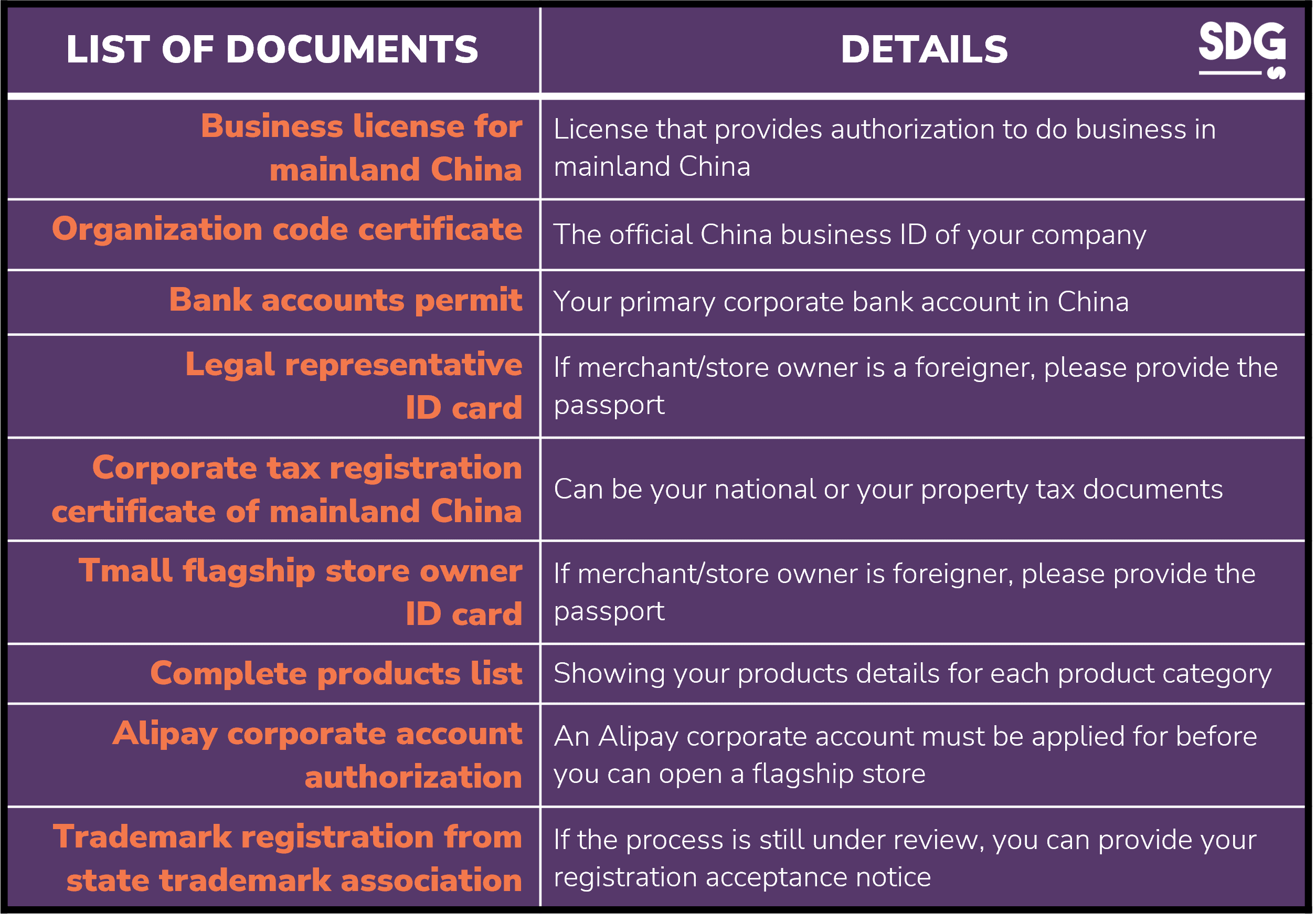
The Advantages of setting up a Tmall Account
Tmall is an already well-established and integral part of China’s e-commerce ecosystem. Chinese consumers trust the brands they encounter whilst shopping and feel secure making purchases on the site, knowing that they can use Tmall’s 7-day return policy.
Tmall sales revenue grows exponentially every year because of the amount of user engagement that the site generates. In fact, more than 780 million consumers in China have made at least a single purchase through Tmall.
Tmall is an accessible key connection point that links international brands to China’s e-commerce market. It’s no wonder why there are now over 70,000 brands and 50,000 online stores on Tmall, all contributing to the growth of Tmall’s gross merchandise volume.
You may also be aware of China’s shopping festivals that take place at various different times of the year. The most popular festival is the 11.11 (双11) shopping festival.
During “Singles Day” or 11.11, sales records are broken and celebrated in China. Tmall plays a huge role in breaking these sales records, which can amount to 74.10 billion RMB in just one day. So, if you are on Tmall, then this day is certainly one to draw a ring around on the calendar.
As part of the Alibaba group ecosystem, Alipay is integrated into Tmall as its online payment system. Alipay is well trusted by Chinese consumers, and they feel very secure making payments through this system.
Tmall also provides “Daily Update” analytical tools that show daily sales reports. Vendors can make use of these updates to plan their sales and marketing strategies.
The Difference between Tmall Global and Tmall.com
For international companies that are not an established entity within Mainland China, there is still a way to set up a virtual store within Alibaba’s rich ecosystem.
In 2014, Alibaba group launched Tmall Global (天猫国际) offering overseas companies a wholesale B2B and retail B2C model, with the ability to import and sell their brands to Chinese consumers – regardless of the company’s international location.
Tmall.com vs Tmall Global
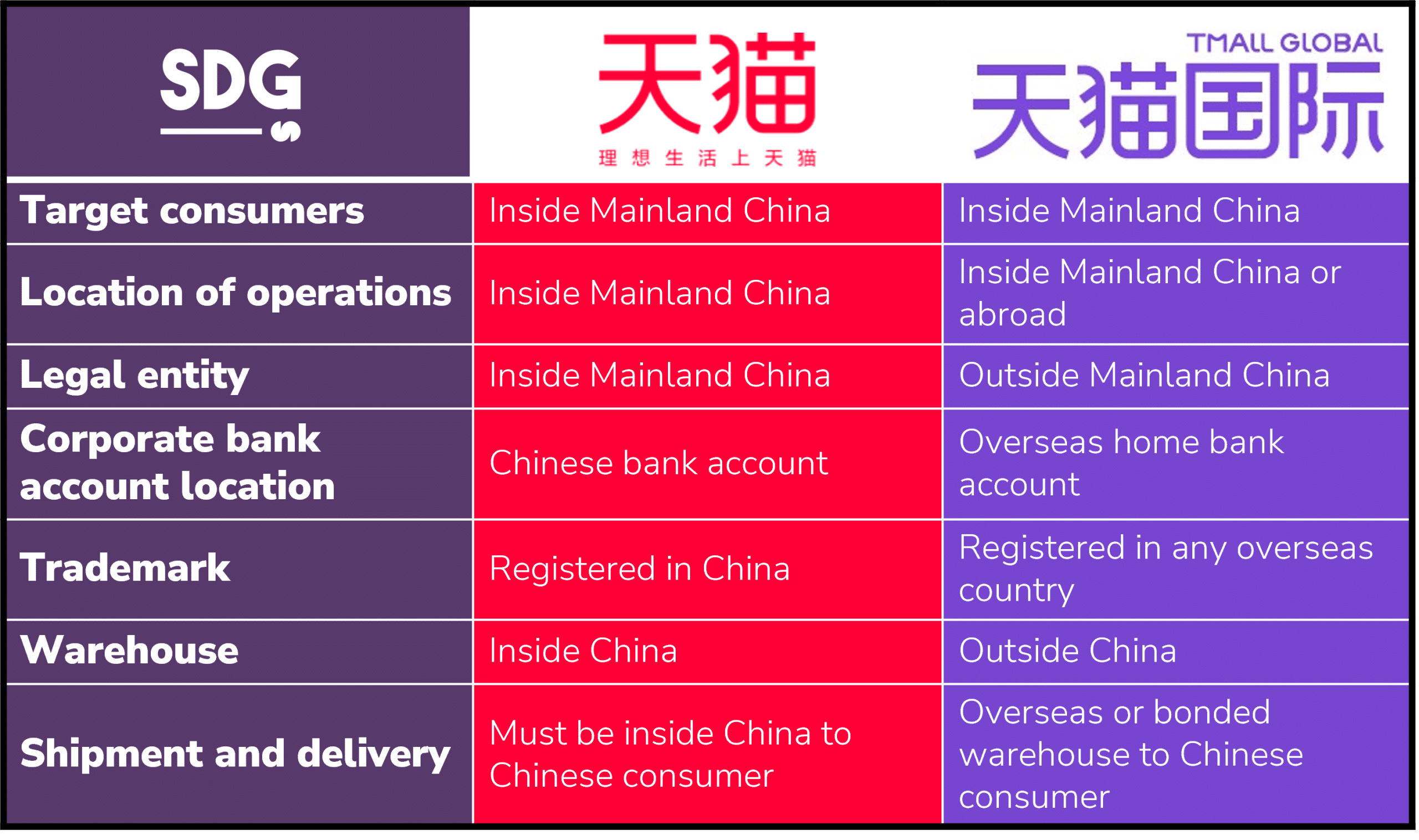
As you can see from the table above, brands that are an already established entity within Mainland China can open their store with Tmall.com, while foreign brands that are overseas can have a cross-border e-Commerce approach by opening their stores on Tmall Global.
Tmall Global: The Main Cross-Border
While the cost of opening a store on Tmall Global is still high, the process on Tmall Global is slightly easier than on Tmall domestic.
In terms of costs, to open a store on Tmall Global requires a deposit of US$ 8,000 to US$ 25,000 and there is also an annual service fee for operating on the platform, this cost can be between US$ 5,000 to US $10,000.
For operational costs, Tmall charges 5% of sales revenue for commission. The commission fee schedules, and other details of costs can be found within Tmall Global’s official application form.
The table below shows the necessary requirements for opening a store on Tmall Global:
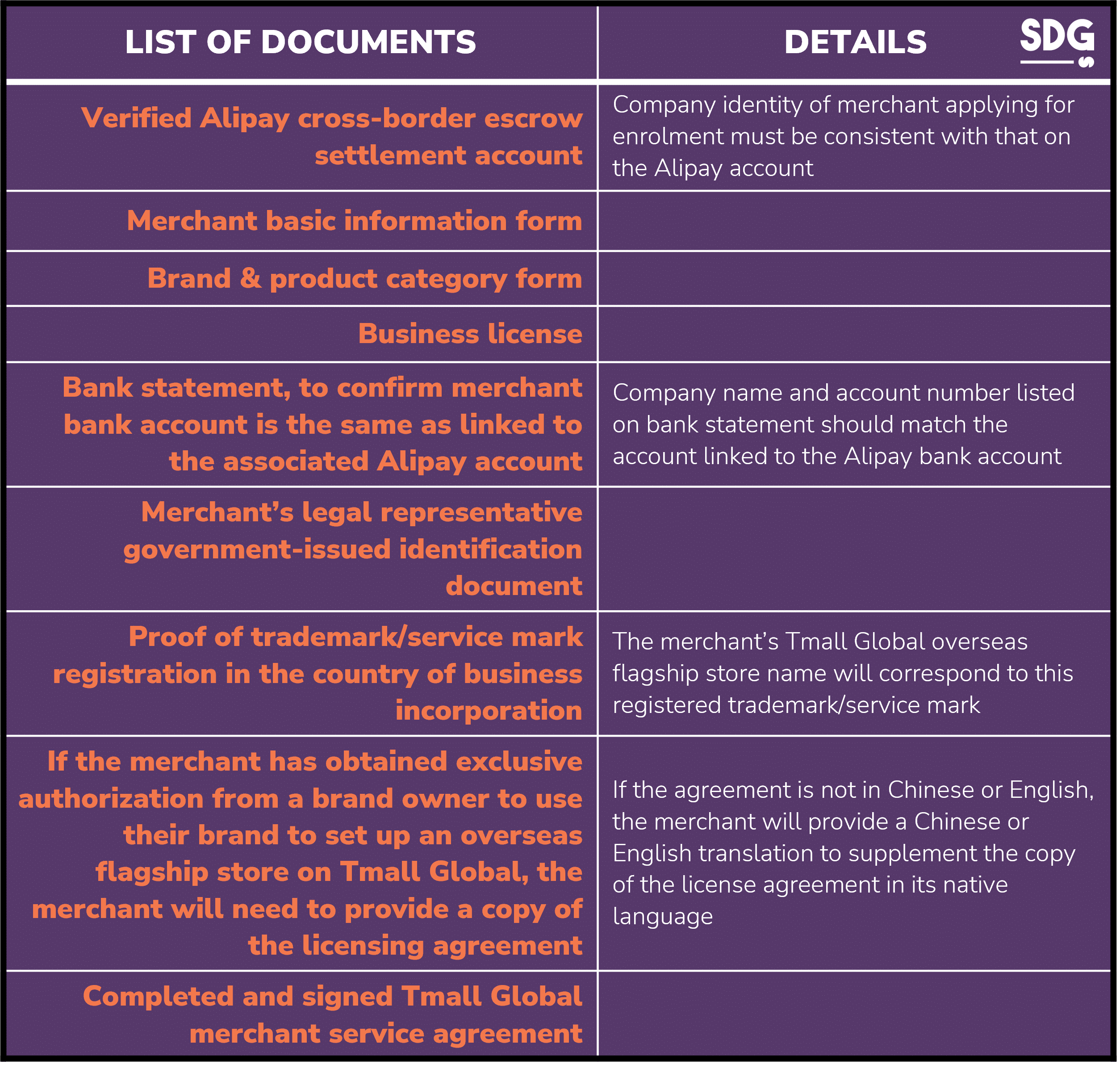
The four cross-border stores you can open on Tmall Global
-
Authorized Stores
- The trademark registration for products will be in Hong Kong (or pending and waiting for approval).
- Evidence of authorization to open a store on Tmall.hk platform will be required.
-
Speciality Stores
- Merchants will need evidence of product source and invoice of the products purchased.
- The name of the shop needs to abide with the legitimate rights of others.
- Allowed to sell in two different product categories.
-
-
Flagship Store
-
- Have trademark registration in Hong Kong (or pending and waiting for approval).
- For merchants who are the brand owner they will need to provide trademark registration for their products.
- Merchants who are the exclusive authorized dealer, will need to provide the trademark registration as well as the letter of authorization for selling their products.
-
Flagship Store (Marketplace)
- Merchant will need to apply for the Class 35 Trademark in Hong Kong for their brand.
- If the merchant is owner of the Service Mark, they will need to provide its trademark registration.
- If they are not the owner of the Service Mark, then they need to provide evidence of authorization to create a store on Tmall.hk with the Service Mark.
The Advantages of setting up a Tmall Global account
Tmall Global is an amazing solution for overseas companies that want to sell directly to Chinese consumers but don’t have an entity within the mainland. Creating an account with Tmall Global is a much easier process and can be done a lot faster than on Tmall.
Many international brands are now choosing to open a store with Tmall Global, with 20,000 global brands registered on the platform from more than 77 different countries.
Tmall Global offers these brands a streamlined solution to gain access to the Chinese e-commerce market, as well as logistical support that makes international shipping simple.
On top of that, your brand will gain awareness through Tmall, and consumers will be able to make secure online transaction through Alipay which is integrated within Tmall Global.
Setting up with Tmall Global does mean that you will have to establish a partnership with a Chinese entity (Tmall Partner), but the benefits of Tmall Global accounts will give your brand a solid foundation to grow and develop in China’s e-commerce market.
E-Commerce Sales Support
Creating a store on Tmall or Tmall Global alone isn’t enough to become a reputable and successful brand in China. Developing a well-known brand image that consumers feel that they can trust requires an effective digital marketing strategy.
Creating presence and awareness in areas such as branding, online reputation, and social media will generate quality leads, lead to more sales and a higher ROI.
Branding
To penetrate into the world of Chinese e-commerce, branding is essential for establishing a recognizable identity within the market. Tmall provides a great branding opportunity for companies that don’t have a store front in China to engage their target consumers.
However, brands that want to get started on Tmall will need to demonstrate that their brand has the ability to attract Chinese consumers. To do this you will need to develop your online reputation and social media presence.
E-Reputation
Managing your E-Reputation in China is an essential part of building your brand awareness and developing a trustworthy brand image.
You can use online official press releases, which will associate your brand with reliable news sources. Chinese consumers rely on these publishers to provide them with quality information as they are regulated by the Chinese authorities.
Non-official Reputation
Brands will also need to consider their non-official reputation by being active on forum sites such as Zhihu (知乎).
Considered to be the Chinese Quora, Zhihu offers brands with a platform to create natural-like articles that followers can read, like and submit comments on. Articles on Zhihu are trusted by consumers as they are seen as authentic.
Influencer Marketing (KOL/KOC)
You may also want to use a Key Opinion Leader (KOL) or Key Opinion Customer (KOC) to promote your brand.
KOLs are online social media superstars who have attained a mass following. Connecting with the correct influencer, will give your brand a huge boost in terms of awareness, engagement, and consumer confidence.
KOCs tend to have less of a following than KOLs but are in some cases more valuable. They can give your brand reputable reviews, advice and comments and give consumers information that feels organic with a friend-like approach.
It is worth noting that KOCs prove to be more effective with millennial consumers.
Social Media
To succeed in China’s e-commerce market, interacting with consumers and being active on social media is essential. Social media offers more than just a way to boost your e-reputation. You can create e-stores, manage customer data with sCRM, develop an O2O connection and so much more.
There are a wide variety of options to choose from when it comes to Chinese social media. However, WeChat is by far the country’s most popular social media platform. There are over 1.2 billion users on WeChat and the users spend a daily average of 66 minutes on the platform.
WeChat provides an integrated system for your brand where you can create an official account, communicate with your consumers, create mini-programs, and manage your followers with a WeChat CRM.
Who is Sekkei Studio
Sekkei Studio is a Digital Marketing Agency that has been helping Companies and Governments with their Digital Marketing campaigns in China since 2008.
13 years of existence are more than enough to prove that, not only we are good at execution but also at growing and scaling up our clients’ operations, whether it’s Branding, e-Commerce, Lead Generation, Online Reputation, etc.
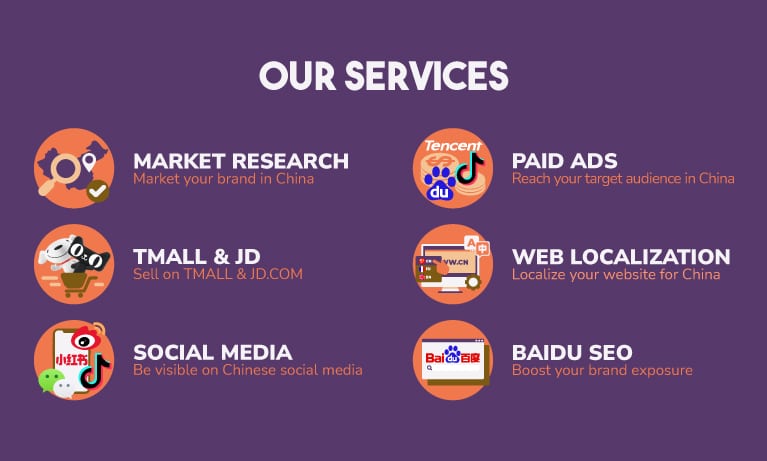
Let us know if you are willing to explore the possibilities of your brand in China or, if you plan to take things to the next level.






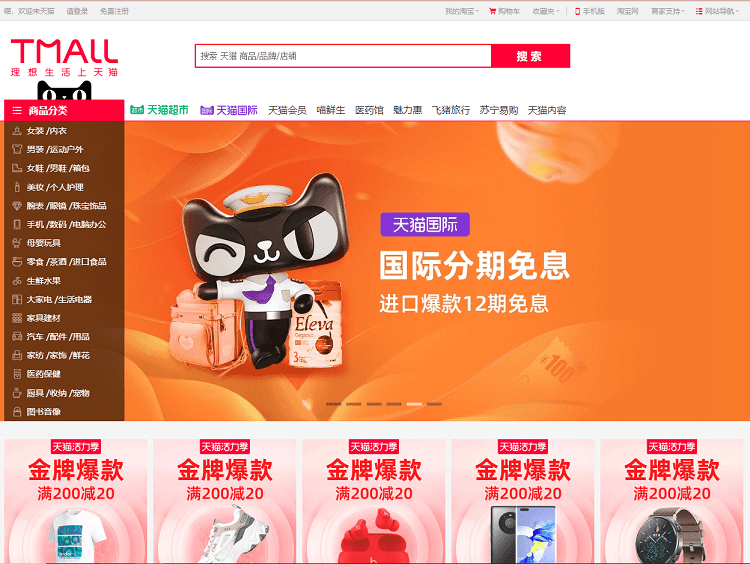

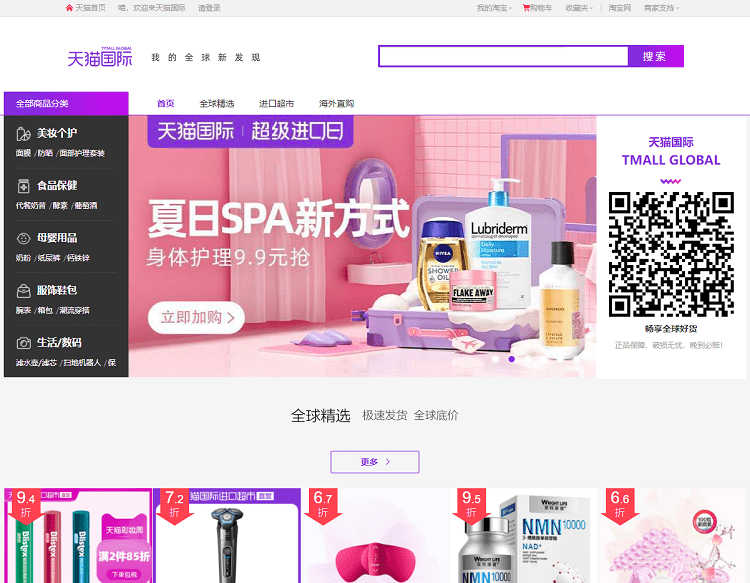

Thank you for such a large amount of useful information. I often read your resource and find a lot of interesting things for myself!